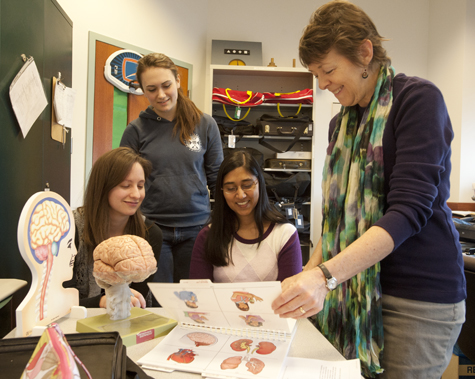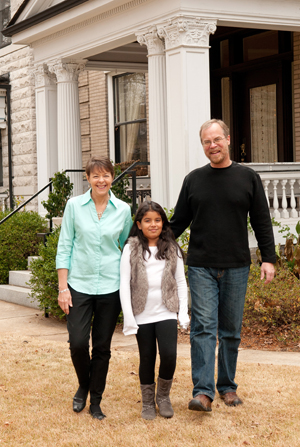
Desirée White, PhD, associate professor of psychology in Arts & Sciences, has a knack for choosing career paths that many people would find emotionally difficult.
As a biology major at the University of North Carolina Charlotte, she had no qualms about wading through swamps in the dark of night to collect reptiles.
Later, while working in an immunology lab in Durham, she spent free time as an on-call crisis counselor for women who had been sexually assaulted, often holding a survivor’s hand while police collected rape kit samples.
And she was 30 years old, married and out of school for eight years when she decided to enroll in Washington University in St. Louis’ graduate program in clinical psychology in 1988.
“There are not a lot of PhDs in my family,” says White, who was born in the small Southern hamlet of Grover, N.C. “This was foreign territory.”
Today, as co-director of the Human Clinical Core within the Washington University Intellectual and Developmental Disabilities Research Center (WUIDDRC), she works closely with clinicians to pinpoint why children with brain injuries or neurological diseases struggle with cognitive skills, such as language and learning.
Her dissertation examined the subtle slowing of speech and working memory in children with cerebral palsy. She’s developed screening tools to identify cognitive effects of silent cerebral strokes in young African-American children with sickle cell. She’s worked one-on-one with a boy so badly beaten that he would forever struggle with basic comprehension.
Struggles of the heart
For White, interacting with children is the easy part.
“I’ve always been drawn to children,” she says. “They give as much back to me as I give to them.”
Children are so adaptive, so malleable, they usually make the best of whatever life hands them, but it’s their parents, says White, who can be heart-wrenching.
“The parents can be so heartbroken, so guilt-ridden,” she says. “Some of them are just so incredibly sad. As a parent, I get that. Everybody wants their child to be perfect.”
The payoff in working with parents, she says, is helping them understand their child’s problems.
“That’s where we can really intervene,” she says. “Help them understand and give them specific strategies for how to work through these problems with their kids, how to really help them instead of stifling or blaming them.”
White’s current research focuses on cognitive issues related to phenylketonuria (PKU), an inherited disease in which children have difficulty metabolizing the essential amino acid phenylalanine. Unless placed on a strict diet of foods low in phenylalanine — no eggs, milk, cheese, meat, nuts, fish or chocolate — the disease can cause profound mental retardation, microcephaly, seizures and behavior problems.
White has shown that PKU disrupts the neurotransmitter dopamine, spurring problems with executive abilities, such as self-control, working memory and strategic processing. Her brain imaging research confirms that PKU also damages white matter that connects brain regions, further compromising executive abilities.
She now leads a clinical trial for a new pharmaceutical treatment for PKU that may improve phenylalanine metabolism and reverse related brain damage. She serves on the National Institutes of Health’s Phenylketonuria Planning Group, and works with a family support group, the National PKU Alliance.
Improving children’s lives
White’s research illustrates the challenges of multidisciplinary research that led to the formation of the university’s disabilities research center. The WUIDDRC brings clinicians and researchers together to share expertise and foster teamwork toward a common goal of improving the lives of children. The center supports the work of more than 40 investigators, 12 departments and 60 research projects.
Terrie E. Inder, MD, PhD, director of the WUIDDRC and professor of pediatrics, of radiology and of neurology and a neonatal specialist at St. Louis Children’s Hospital, says White was an extraordinary resource in the effort to win federal funding for the WUIDDRC.
“Desirée has a very collegial, collaborative spirit,” Inder says. “Her passion and warmth are what resonate. It’s clear that she cares very deeply about helping the people in these research programs, and that includes both the children and the investigators. That’s what drives her.”
White’s core group assists researchers with behavioral assessments and genetic testing. Other cores support statistical analysis, data manipulation, brain imaging and animal modeling.
“You can’t do it all in isolation,” she says. “I can do the behavioral assessments, but if I need to understand the physical changes going on in the brain of someone with PKU, I may call on a colleague with expertise in neuroimaging.”
All sides gain from the shared flow of information.
“When we’re conducting assessments on children, we might get an IQ estimate, a memory score and some measure of vocabulary. We can feed that back to the clinician working with this child, to the family, and even to schools they attend.”
Southern roots
White traces her interest in helping children to experiences back in third grade. She’s never forgotten how classmates and teachers treated a boy who had, as she now recognizes, “one of the most severe cases of ADHD persons I’ve come across.”
“I felt so badly for this kid,” she says. “The way he was looked down upon and treated quite brutally. It just broke my heart. He has stayed with me.”
White describes her hometown as bearing an uncanny resemblance to the Southern gothic community captured in T.R. Pearson’s first novel, A Short History of a Small Place — full of interesting characters, oddities and intrigue; things everybody knows but never talks about.
Both of her parents worked at a local textile factory, and White spent days with her grandfather, a one-time bootlegger turned seminarian, who later became a master carpenter and amateur horticulturist.
White tagged along behind him, learning at an early age how to graft apple trees and bud roses. She explored cow pastures behind her house, turning over creek rocks and returning home with small animals. She built a brick enclosure for her terrapin collection and tried to brood wooly worms in her grass-filled EZ-Bake Oven.

“My parents must have thought I was nuts,” she says.
Few people in White’s extended family had attended college. None had finished. She chose the UNC Charlotte because it was close to home and affordable. She took courses in oceanology, herpetology, genetics and a couple of electives in psychology, graduating in 1980 with a bachelor’s in biology.
She considered graduate school in genetics, but family circumstances dictated she go to work. She landed a job as an immunology research technician at Duke University, where she dissected lymph nodes from mice and gradually, over eight years, earned other lab responsibilities.
“The last few years we were doing a lot of genetic sequencing, a lot of tissue culture and looking at T-cell interactions,” she recalls.
She and her husband, Bruce Rogers, a carpenter she’d met after college, had what she describes as “an earthy, crunchy kind of life” in Durham. They lived in a log house a mile up a dirt road. She grew vegetables and learned to weave rugs on a floor loom. He built solar homes.
Back to school
Looking to do still more with her life, she began volunteering with a rape crisis center. “I started to realize,” she says, “that I had — well, not missed the boat, because I loved biology — but missed another piece that I could have taken advantage of in college, and that was psychology.”
She made the decision to enroll in the Clinical Psychology Program at WUSTL, and Suzanne Craft, PhD, became her mentor. White followed in her footsteps, earning a doctorate in clinical psychology in 1993. White moved to Brown University, where she interned at a psychiatric hospital, and to University of California-San Diego for a fellowship with pioneering neuropsychologists Robert Heaton and Nelson Butters.
White was finishing up in San Diego as her mentor was preparing to leave WUSTL. White was hired as an instructor to keep the neuropsychology track going and, one year later, selected to fill the position.
“I never dreamed that I’d have a chance to come back here after graduation, but Suzanne left and I came back,” White says. “I literally got my mentor’s job. It’s been lots of hard work, but every minute has been worth it.”
Fast Facts about Desirée White
Born: Grover, N.C., 1958
Family: Husband, Bruce; daughter, Sophia, age 10,
Resides: 100-year-old home in Skinker-DeBaliviere neighborhood
Pets: Two dogs, two birds, three fish, three hermit crabs.
Hobbies: Gardening, travel, home renovations.